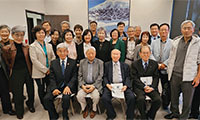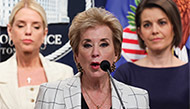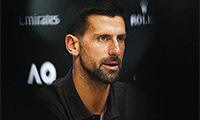In synagogue on Saturday, before saying the customary prayer for our country, the rabbi asked us to reflect on the fact that a new president would be inaugurated on Tuesday, and urged us to focus a little more intently than usual on the prayer. The congregants did so, it seemed to me, as we read,“Our God and God of our ancestors: We ask your blessings for our country - for its government, for its leaders and advisers, and for all who exercise just and rightful authority ...”
Barack Obama assumed that just and rightful authority at noon on Tuesday. The new president is the man of the moment. He deserves good wishes and sincere prayers. But I’ve found myself thinking these last few days more about the man who has shouldered the burdens of office for the past eight years, George W. Bush.
He wasn’t my favorite among Republicans in 2000. He has made mistakes as president, and has limitations as a leader. But he has exercised his just and rightful authority in a way - I believe - that deserves recognition and respect.
It will probably be a while before he gets much of either. In synagogue, right after the prayer for our country, there is a prayer for the state of Israel, asking the“rock and redeemer of the people Israel”to“spread over it the shelter of your peace.”As we recited this on Saturday, I couldn’t help but reflect that a distressingly small number of my fellow Jews seem to have given much thought at all to the fact that President Bush is one of the greatest friends the state of Israel - and, yes, the Jewish people - have had in quite a while. Bush stood with Israel when he had no political incentive to do so and received no political benefit from doing so. He was criticized by much of the world. He did it because he thought it the right thing to do.
He has been denounced for this, as Israel has been denounced for doing what it judged necessary to defend itself. The liberal sage Bill Moyers has been a harsh critic of Bush. On January 9, on the PBS television network, he also lambasted Israel for what he called its“state terrorism,”its“waging war on an entire population” in Gaza. He traced this Israeli policy back to the Bible, where “God-soaked violence became genetically coded,”apparently in both Arabs and Jews. I wouldn’t presume to say what is and isn’t“genetically coded”in Moyers’s respectable Protestant genes. But I’m glad it was George W. Bush making decisions over the last eight years, not someone wellthought of by Moyers.
Many of Bush’s defenders have praised him for keeping the country safe since September 11, 2001. He deserves that praise, and I’m perfectly happy to defend most of his surveillance, interrogation and counterterrorism policies against his critics.
But I don’t think keeping us safe has been Bush’s most impressive achievement. That was winning the war in Iraq, and in particular, his refusal to accept defeat when so many counseled him to do so in late 2006. His ordering the surge of troops to Iraq in January 2007 was an act of personal courage and of presidential leadership. The results have benefited both Iraq and the United States. And the outcome in Iraq is a remarkable gift to the incoming president, who now only has to sustain success, rather than trying to deal with the consequences in the region and around the world of a humiliating withdrawal and a devastating defeat.
The cost of the war in Iraq, and in Afghanistan, has been great. In the midst of all the other activities during the final week of an administration, Bush had 40 or so families of fallen soldiers to the White House. The staff had set aside up to two hours. Bush, a man who normally keeps to schedule, spent over four hours meeting in small groups with the family members of those who had fallen in battle.
The weekend before his inauguration Barack Obama added to his itinerary a visit to Arlington National Cemetery. Obama knows that he, too, will be a war president. He knows the decisions he makes as commander in chief will be his most consequential. And so on Sunday morning, before going to church, he placed a wreath at the Tomb of the Unknowns and stood silently as taps was sounded.
The somber tableau provided quite a contrast to all the hubbub and talk of the last few days. Obama’s silent tribute captured a deeper truth, and - I dare say - a more fundamental hope, than could any speech.
스마터리빙
more [ 건강]
[ 건강]이제 혈관 건강도 챙기자!
[현대해운]우리 눈에 보이지 않기 때문에 혈관 건강을 챙기는 것은 결코 쉽지 않은데요. 여러분은 혈관 건강을 유지하기 위해 어떤 노력을 하시나요?
 [ 건강]
[ 건강]내 몸이 건강해지는 과일궁합
 [ 라이프]
[ 라이프]벌레야 물럿거라! 천연 해충제 만들기
 [ 건강]
[ 건강]혈압 낮추는데 좋은 식품
[현대해운]혈관 건강은 주로 노화가 진행되면서 지켜야 할 문제라고 인식되어 왔습니다. 최근 생활 패턴과 식생활의 변화로 혈관의 노화 진행이 빨라지고
사람·사람들
more많이 본 기사
- 반복되는 일가족 살해 ‘비극’… 3명 사망
- 또 ICE 이민 급습 단속… 자바시장 ‘공포 분위기’
- “타이레놀 자폐 무관” 트럼프 주장에 반박
- 오늘 ‘마틴 루터 킹 데이’ 관공서·은행·우체국 휴무
- LA 집값 ‘기본이 100만불’… 밸리·토랜스 등 15곳 늘어
- ‘엔비디아, 연말 시총 7조달러 돌파’
- 이민 단속 시 시민권 증명 요구 합법일까… “의무 아니지만 휴대시 체포 예방”
- 연준 독립성 약화 시 미 신용등급 ‘부정적’
- “미국 물러가라”… 그린란드서 첫 트럼프 규탄시위
- 전기료 급등에 화난 유권자 중간선거 앞둔 트럼프 ‘긴장’
- 서울대 남가주 총동창회 이사회
- NASA 우주비행사들 반세기 만에 달로… ‘아르테미스’ 로켓 발사대 섰다
- 드림 부동산, 새해 시무식 개최
- 올해 월드컵 한인사회 합동 응원 펼친다
- 트럼프 정부, 비자 10만 건 이상 취소… 역대 최다
- 5번 Fwy ‘3중 추돌’ 1명 사망·5명 부상
- “페널티 없이 401(k)로 주택 다운페이”
- 이민성호, U-23 아시안컵 4강 ‘한일전’ 성사
- 12월 전국 고용 5만명 증가에 그쳐 부진
- 양아빠 머리에 방아쇠 당긴 11살 소년
- 트럼프, 그린란드 파병 유럽 8개국에 ‘관세 폭탄’
- ‘영화 속 미래가 현실로’… CES 2026 주목할 신제품
- LA 시장·주지사 선거 카루소 ‘불출마’ 선언
- 차기 연준의장 인선 ‘판도 변화’
- 자산운용사 ‘블랙록’ 자산 14조달러 돌파
- [이민법 칼럼] 기술자와 취업이민 1순위(EB-1C)
- 조코비치 “알카라스·신네르 강해도 내게도 기회”
- 대한인국민회 기념재단 이취임식
- LA 올림픽 티켓 사전등록 열기 폭발
- 학술 출판물·연구 논문 인용 기준, ‘세계 대학 1위’… 하버드, 중국에 뺏겼다
- 울버햄프턴 황희찬, 또 이적설 이번에는 PSV 에인트호번
- 한국계 투수 오브라이언, WBC 한국대표팀 합류 열망
- 뱅크오브호프 황윤석 이사 올해 은퇴
- K-프랜차이즈 세미나 15일 열려
- “아마존, 공급업체들에 가격인하 압박”
- 메모리도 고율 관세… 삼성·SK, 미 투자확대 압박 커진다
- 핵심 광물공급망 법안, 영 김 하원의원 등 발의
- 신차 구매자 월 할부금 1천달러 훌쩍… 구입 시 고려할 점
- “레드라인 넘었다”…트럼프 달래던 유럽, 반격으로 기우나
- 고환율 딛고… 대한항공 매출 16.5조 사상 최대
- 올해 연방 학자금 대출 전면 개편… 한도 큰 폭 축소
- 넷플릭스, 소니 영화 독점계약 체결
- 주법으로 AI 규제·처벌 50개 주 중 48개 주 도입
- 지정학적 일대 재난사태로…
- 트럼프 ‘이란 공격’ 보류한 배경은… “美중동전력 충분치 않았다”
- 11가지 능력으로 알아보는 나의 열정 분야
- “재정보조 - 최선의 선택이 아닌 최고의 선택이어야”
- 여전히 뜨거운 명문대 입시 ‘아시안 택스’ 논쟁
- 삼성 차세대 건조기 개발, 미 정부가 돈 댄다
- 가족이민 전부문 3개월째 제자리
1/5지식톡

-
 한국 안경을 무료 배송으로 받아보실…
0
한국 안경을 무료 배송으로 받아보실…
0안녕하세요. 서울 안암동에 위치한 ‘보고싶다 안경원’입니다.저희는 다년간 한국 고객분들께 착용감 좋은 안경테와 한국안경브랜드,고압축 도수 렌즈를 합리적인 가격에 제공해온 안경 전문점입니다.이번에 해외 배송이 가능해…
-
 미 육군 사관학교 West Poin…
0
미 육군 사관학교 West Poin…
0https://youtu.be/SxD8cEhNV6Q연락처:wpkapca@gmail.comJohn Choi: 714-716-6414West Point 합격증을 받으셨나요?미 육군사관학교 West Point 학부모 모…
-
 ☝️해외에서도 가능한 한국어 선생님…
0
☝️해외에서도 가능한 한국어 선생님…
0이 영상 하나면 충분합니다!♥️상담신청문의♥️☝️ 문의 폭주로 '선착순 상담'만 진행합니다.☎️ : 02-6213-9094✨카카오톡ID : @GOODEDU77 (@골뱅이 꼭 붙여주셔야합니다…
-
 테슬라 자동차 시트커버 장착
0
테슬라 자동차 시트커버 장착
0테슬라 시트커버, 사놓고 아직 못 씌우셨죠?장착이 생각보다 쉽지 않습니다.20년 경력 전문가에게 맡기세요 — 깔끔하고 딱 맞게 장착해드립니다!장착비용:앞좌석: $40뒷좌석: $60앞·뒷좌석 …
-
 식당용 부탄가스
0
식당용 부탄가스
0식당용 부탄가스 홀세일 합니다 로스앤젤레스 다운타운 픽업 가능 안녕 하세요?강아지 & 고양이 모든 애완동물 / 반려동물 식품 & 모든 애완동물/반려동물 관련 제품들 전문적으로 홀세일/취급하는 회사 입니다 100% …
케이타운 1번가
오피니언
 옥세철 논설위원
옥세철 논설위원지정학적 일대 재난사태로…
 메건 매카들 워싱턴포스트 칼럼니스트
메건 매카들 워싱턴포스트 칼럼니스트 [메건 매카들 칼럼] 보고 싶은 것만 보기
 박소정 더 트리니티 대표 한국공공외교학회 문화외교 이사
박소정 더 트리니티 대표 한국공공외교학회 문화외교 이사 [박소정의 아트 비즈니스] AI와 예술
 조형숙 시인·수필가 미주문협 총무이사
조형숙 시인·수필가 미주문협 총무이사 잃어버린 것의 자리에서
 민병권 / 서울경제 논설위원
민병권 / 서울경제 논설위원[만화경] 안동 사과와 한일 정상회담

한인 2세들 ‘족쇄’ 국적법 신속 개정해야

노동법 준수로 공정의 새해 열자
 조지 F·윌 워싱턴포스트 칼럼니스트
조지 F·윌 워싱턴포스트 칼럼니스트 [조지 F. 윌 칼럼] 올 중간선거를 덜 불쾌하게 만드는 길
 최규성 삼성서울병원 이식외과 교수
최규성 삼성서울병원 이식외과 교수 [로터리] ‘토의 간’
1/3지사별 뉴스

뉴욕한인회‘제123주년 미주한인의 날’ 기념식 성황
뉴욕한인회(회장 이명석)가 13일 맨하탄 뉴욕한인회관에서 개최한‘제123주년 미주한인의 날’ 기념 행사가 각계에서 활동 중인 1.5세 및 2세…
국적이탈 수속에 2년이나 걸리다니⋯

연방의회서 “한인 위상·한미동맹 제고” 한목소리
한인 이민자들이 미국에 도착한 123주년을 기념하고 한인들의 미국 사회에의 기여를 알리는 ‘제 21회 미주 한인의 날’ 행사가 13일 연방의회…
보모와 불륜 북VA 남성, 완전범죄 노리고…

미네소타 또 긴장 고조…육군 투입 대기에 주방위군 동원령
이민세관단속국(ICE) 요원의 총격 사건을 계기로 격렬한 시위가 계속되는 미네소타주에서 긴장이 더 고조되고 있다.국방부가 알래스카에 주둔 중인…
재미한국학교협의회




















































.png)


댓글 안에 당신의 성숙함도 담아 주세요.
'오늘의 한마디'는 기사에 대하여 자신의 생각을 말하고 남의 생각을 들으며 서로 다양한 의견을 나누는 공간입니다. 그러나 간혹 불건전한 내용을 올리시는 분들이 계셔서 건전한 인터넷문화 정착을 위해 아래와 같은 운영원칙을 적용합니다.
자체 모니터링을 통해 아래에 해당하는 내용이 포함된 댓글이 발견되면 예고없이 삭제 조치를 하겠습니다.
불건전한 댓글을 올리거나, 이름에 비속어 및 상대방의 불쾌감을 주는 단어를 사용, 유명인 또는 특정 일반인을 사칭하는 경우 이용에 대한 차단 제재를 받을 수 있습니다. 차단될 경우, 일주일간 댓글을 달수 없게 됩니다.
명예훼손, 개인정보 유출, 욕설 등 법률에 위반되는 댓글은 관계 법령에 의거 민형사상 처벌을 받을 수 있으니 이용에 주의를 부탁드립니다.
Close
x